Abstract
Evaluative studies of outcomes of traditional school health education programs have shown that they are very effective in increasing knowledge, somewhat effective in improving attitudes, and, with few notable exceptions, generally ineffective in changing health practices. This paper discusses the previous reviews of the literature of outcomes of school health education programs, and discusses the constraints inherent in school-based activities; an emphasis on cognitive learning, lecture-oriented teaching methods, inadequate pupil assessment procedures, a captive audience, competing subject areas, competing behavioral influences, behavior change attempts directed at ingrained health habits, inadequate coordination with community resources, and lack of consensus regarding educational goals. The paper then examines several recent successful school health education programs emphasizing non-traditional approaches in self-initiated care, pregnancy prevention, smoking prevention, and nutrition. It is concluded that school-based health education programs have three important roles in community health promotion: 1. the provision of a fundamental understanding of health and disease concepts to large segments of the population; 2. the reinforcement of positive health attitudes; and 3. the alteration of concurrent health behaviors for significant health problems. Although school health education may be helpful in enhancing decision-making and social interaction skills, little empirical evidence exists at this time to support this conclusion.
Full text
PDF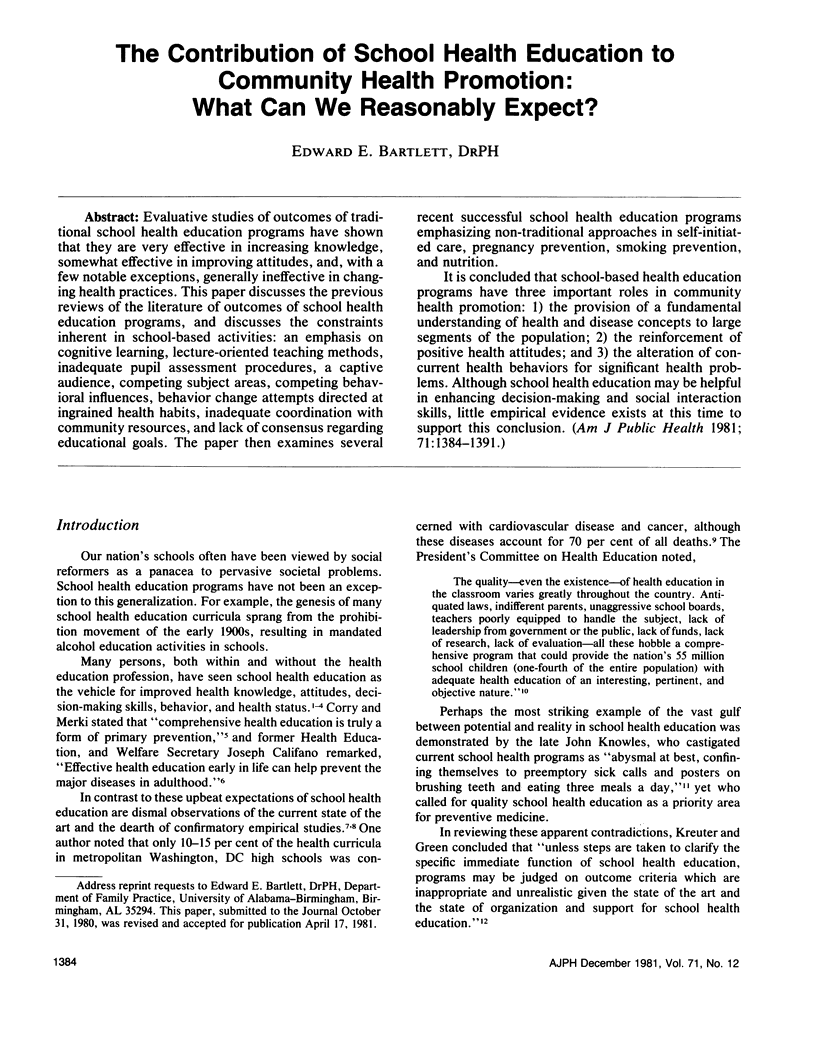
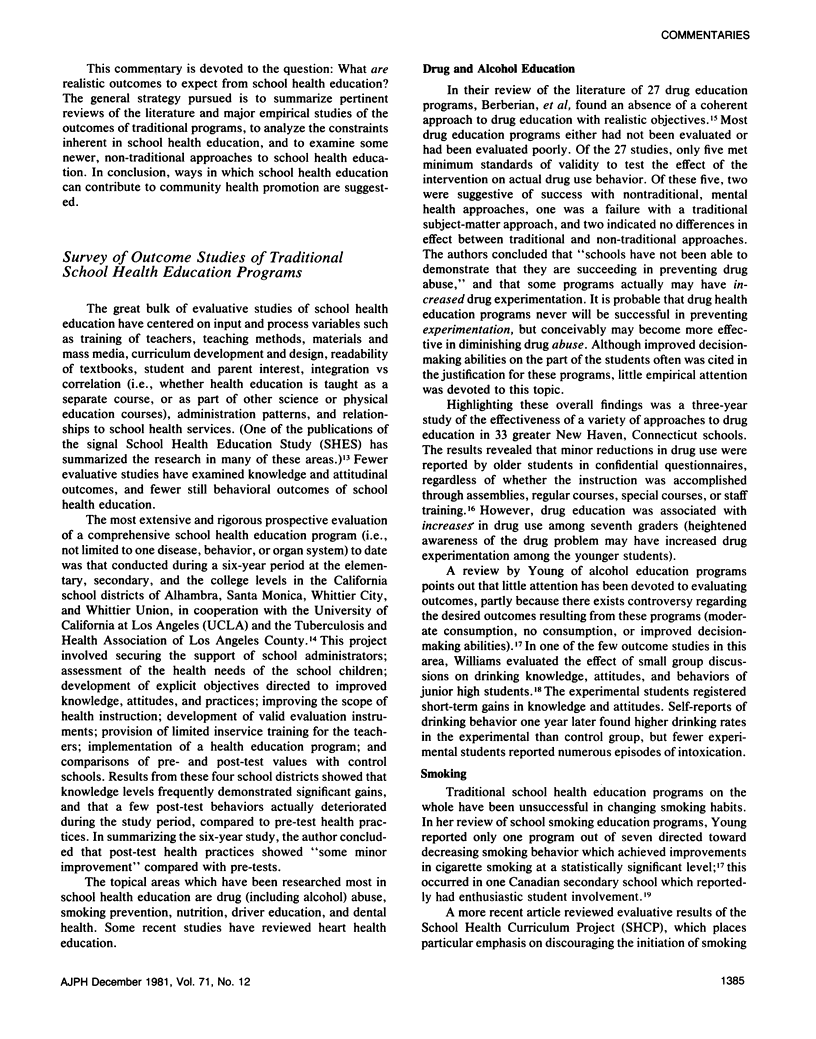
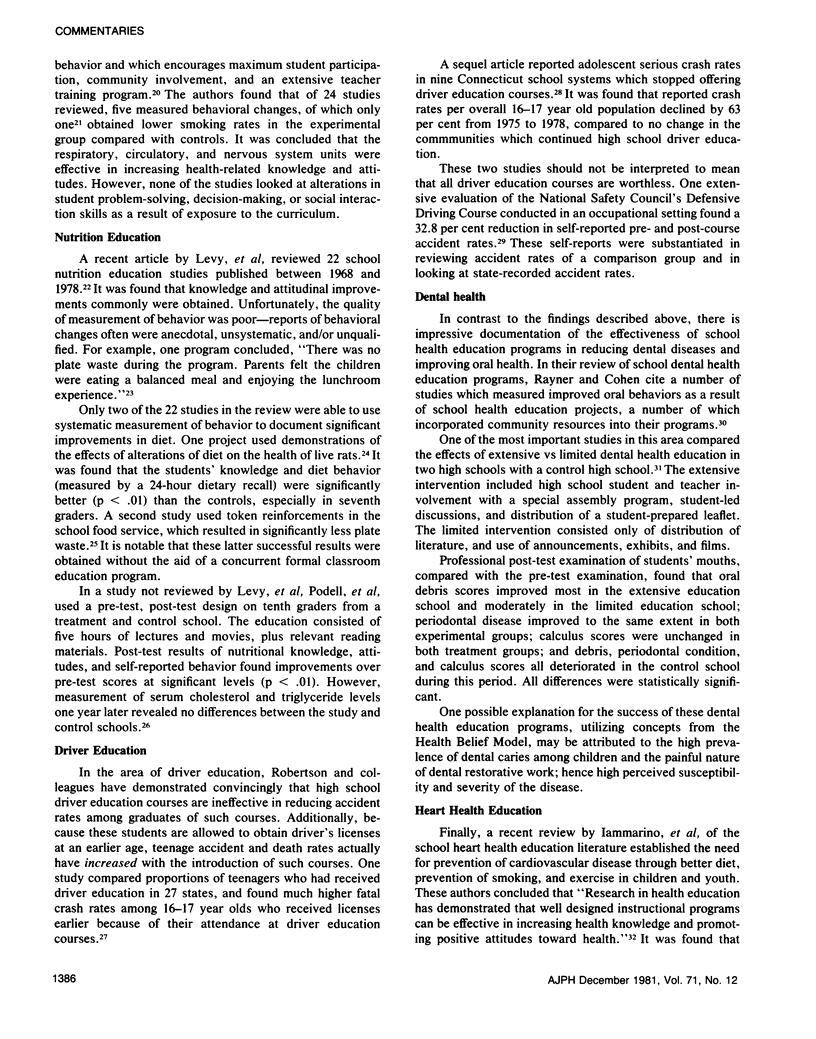
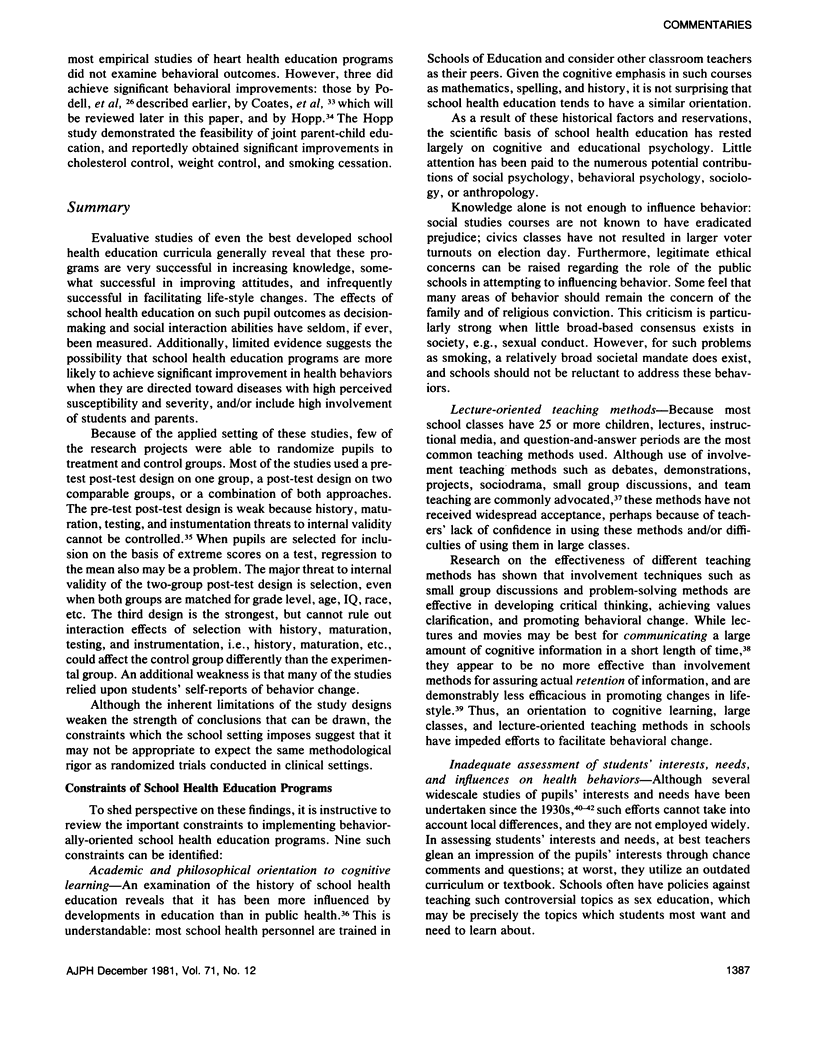
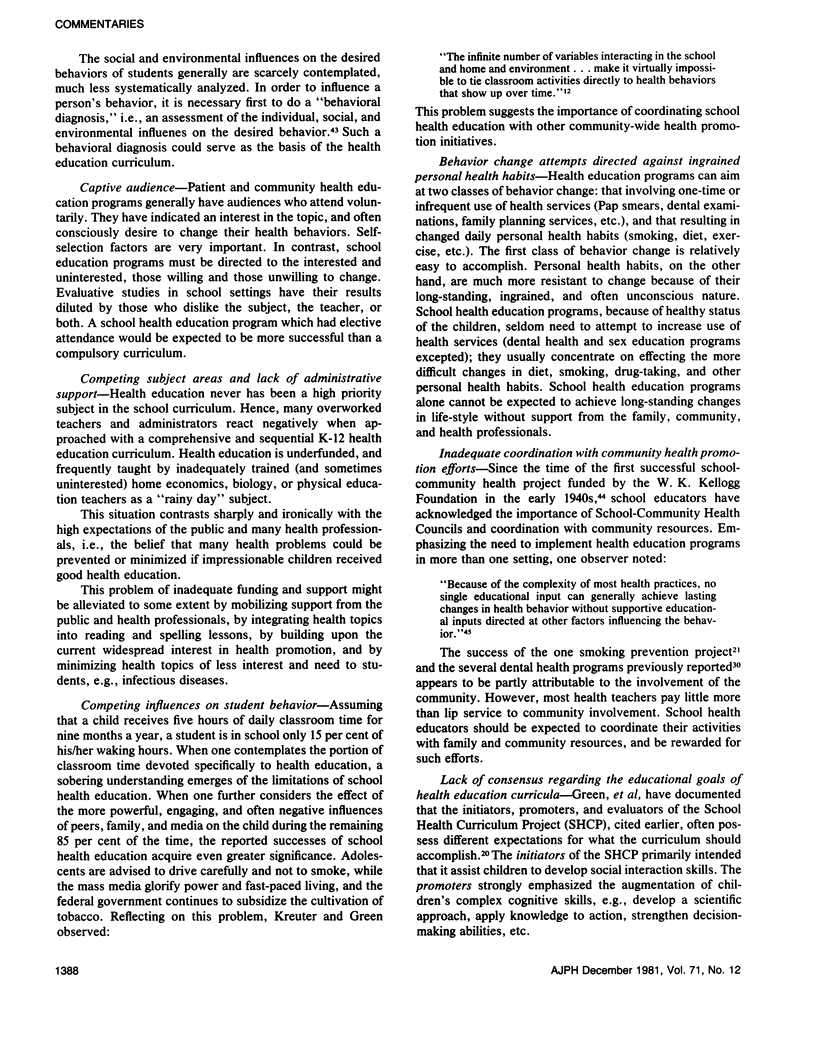
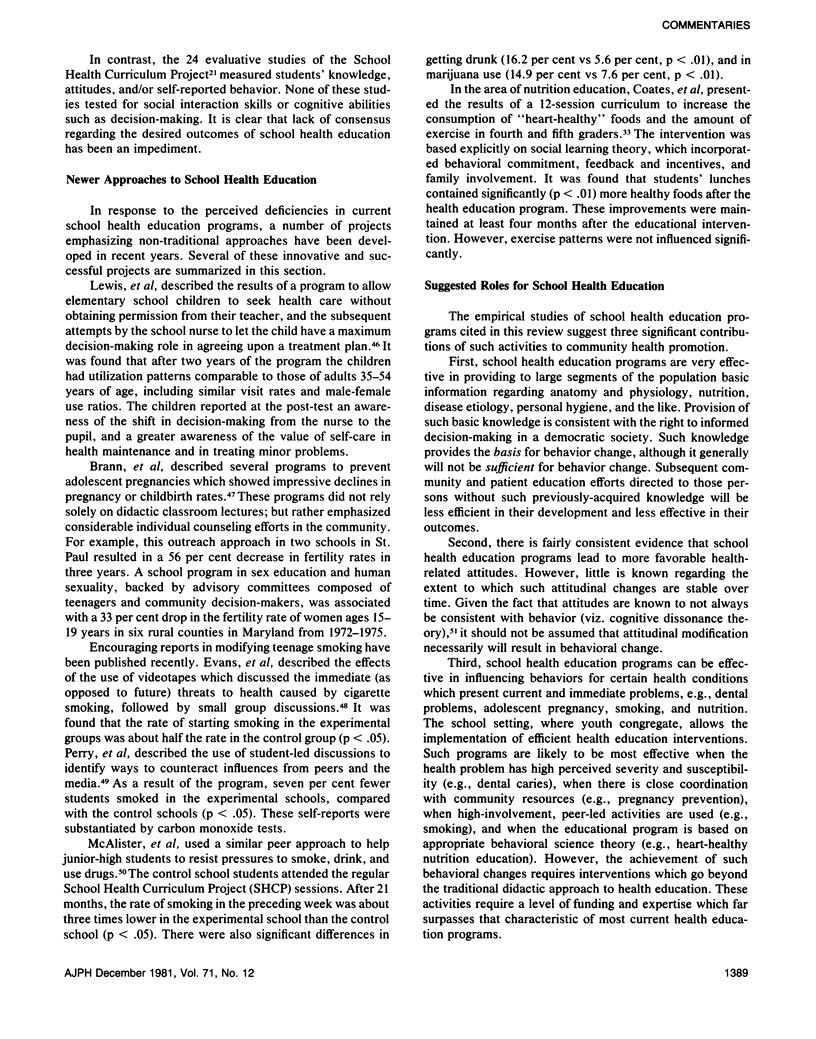
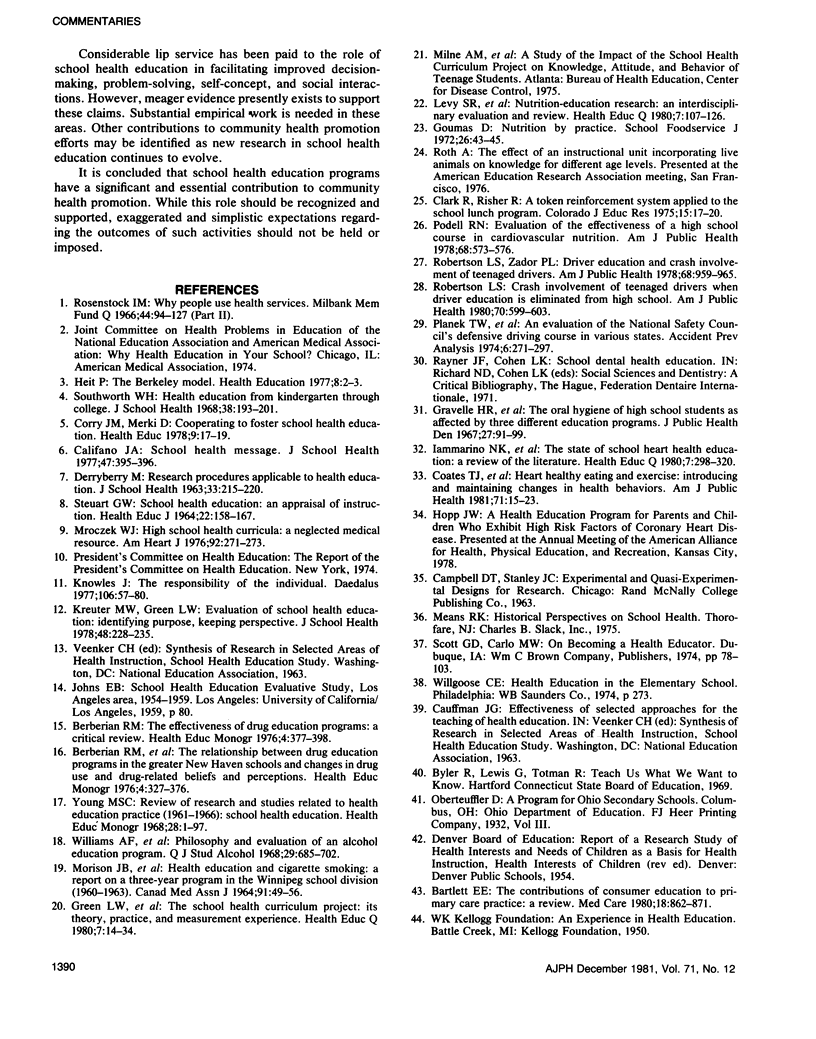
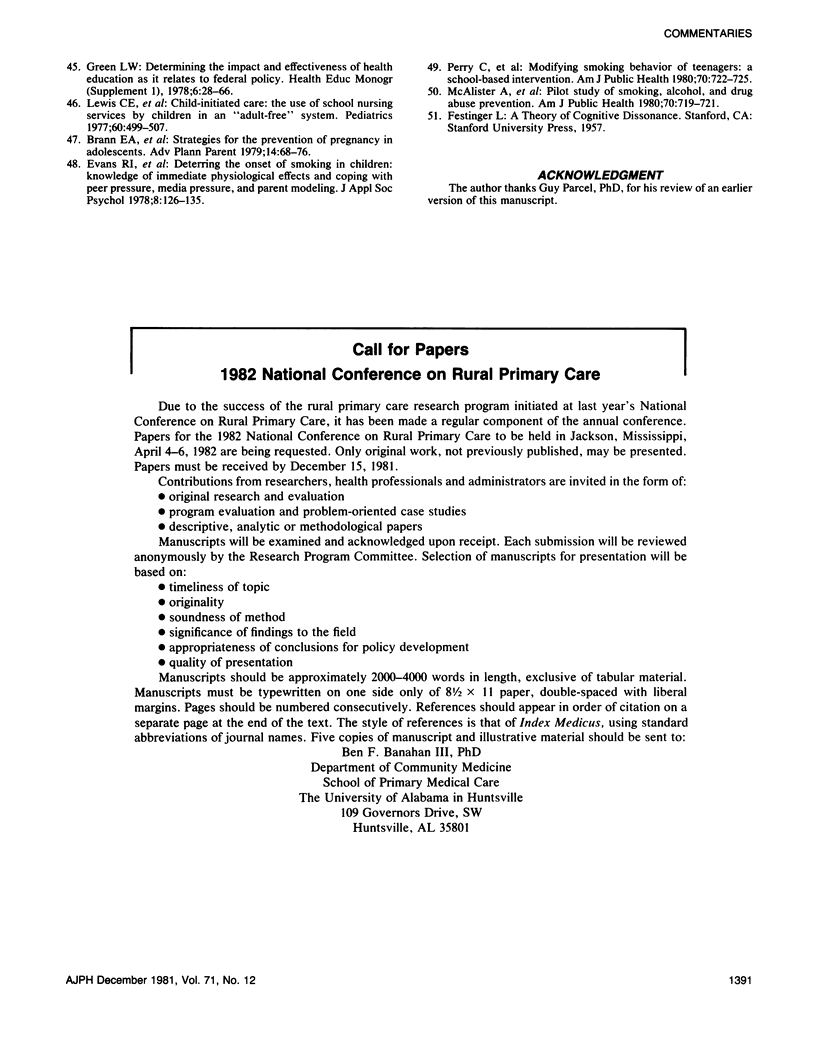
Selected References
These references are in PubMed. This may not be the complete list of references from this article.
- Bartlett E. E. The contributions of consumer health education to primary care practice: a review. Med Care. 1980 Aug;18(8):862–871. doi: 10.1097/00005650-198008000-00008. [DOI] [PubMed] [Google Scholar]
- Berberian R. M., Gross C., Lovejoy J., Paparella S. The effectiveness of drug education programs: a critical review. Health Educ Monogr. 1976 Winter;4(4):377–398. doi: 10.1177/109019817600400404. [DOI] [PubMed] [Google Scholar]
- Berberian R. M., Thompson W. D., Kasl S. V., Gould L. C., Kleber H. D. The relationship between drug education programs in the Greater New Haven schools and changes in drug use and drug-related beliefs and perceptions. Health Educ Monogr. 1976 Winter;4(4):327–376. doi: 10.1177/109019817600400403. [DOI] [PubMed] [Google Scholar]
- Califano J. A., Jr School health message. J Sch Health. 1977 Sep;47(7):395–396. doi: 10.1111/j.1746-1561.1977.tb01098.x. [DOI] [PubMed] [Google Scholar]
- Coates T. J., Jeffery R. W., Slinkard L. A. Heart healthy eating and exercise: introducing and maintaining changes in health behaviors. Am J Public Health. 1981 Jan;71(1):15–23. doi: 10.2105/ajph.71.1.15. [DOI] [PMC free article] [PubMed] [Google Scholar]
- DERRYBERRY M. Research procedures applicable to health education. J Sch Health. 1963 May;33:215–220. doi: 10.1111/j.1746-1561.1963.tb00390.x. [DOI] [PubMed] [Google Scholar]
- Green L. W., Heit P., Iverson D. C., Kolbe L. J., Kreuter M. The school health curriculum project: its theory, practice, and measurement experience. Health Educ Q. 1980 Spring;7(1):14–34. doi: 10.1177/109019818000700103. [DOI] [PubMed] [Google Scholar]
- Heit P. The Berkeley Model. Health Educ. 1977 Jan-Feb;8(1):2–3. [PubMed] [Google Scholar]
- Iammarino N. K., Weinberg A. D., Holcomb J. D. The state of school heart health education: a review of the literature. Health Educ Q. 1980 Winter;7(4):298–320. doi: 10.1177/109019818000700404. [DOI] [PubMed] [Google Scholar]
- Knowles John H. The responsibility of the individual. Daedalus. 1977 Winter;106(1):57–80. [PubMed] [Google Scholar]
- Kreuter M. W., Green L. W. Evaluation of school health education: identifying purpose, keeping perspective. J Sch Health. 1978 Apr;48(4):228–235. doi: 10.1111/j.1746-1561.1978.tb03798.x. [DOI] [PubMed] [Google Scholar]
- Levy S. R., Iverson B. K., Walberg H. J. Nutrition-education research: an interdisciplinary evaluation and review. Health Educ Q. 1980 Summer;7(2):107–126. doi: 10.1177/109019818000700202. [DOI] [PubMed] [Google Scholar]
- MORISON J. B., MEDOVY H., MACDONELL G. T. HEALTH EDUCATION AND CIGARETTE SMOKING: A REPORT ON A THREE-YEAR PROGRAM IN THE WINNIPEG SCHOOL DIVISION, 1960-1963. Can Med Assoc J. 1964 Jul 11;91:49–56. [PMC free article] [PubMed] [Google Scholar]
- Mroczek W. J. High school health curricula: a neglected medical resource. Am Heart J. 1976 Sep;92(3):271–273. doi: 10.1016/s0002-8703(76)80105-6. [DOI] [PubMed] [Google Scholar]
- Podell R. N., Keller K., Mulvihill M. N., Berger G., Kent D. F. Evaluation of the effectiveness of a high school course in cardiovascular nutrition. Am J Public Health. 1978 Jun;68(6):573–576. doi: 10.2105/ajph.68.6.573. [DOI] [PMC free article] [PubMed] [Google Scholar]
- Robertson L. S. Crash involvement of teenaged drivers when driver education is eliminated from high school. Am J Public Health. 1980 Jun;70(6):599–603. doi: 10.2105/ajph.70.6.599. [DOI] [PMC free article] [PubMed] [Google Scholar]
- Robertson L. S., Zador P. L. Driver education and fatal crash involvement of teenaged drivers. Am J Public Health. 1978 Oct;68(10):959–965. doi: 10.2105/ajph.68.10.959. [DOI] [PMC free article] [PubMed] [Google Scholar]
- Rosenstock I. M. Why people use health services. Milbank Mem Fund Q. 1966 Jul;44(3 Suppl):94–127. [PubMed] [Google Scholar]
- Southworth W. H. Health education from kindergarten through college. J Sch Health. 1968 Apr;38(4):193–202. doi: 10.1111/j.1746-1561.1968.tb04982.x. [DOI] [PubMed] [Google Scholar]
- Weiss S. F. Dental health education in Florida. Health Educ. 1978 Mar-Apr;9(2):17–19. [PubMed] [Google Scholar]
- Williams A. F., DiCicco L. M., Unterberger H. Philosophy and evaluation of an alcohol education program. Q J Stud Alcohol. 1968 Sep;29(3):685–702. [PubMed] [Google Scholar]


